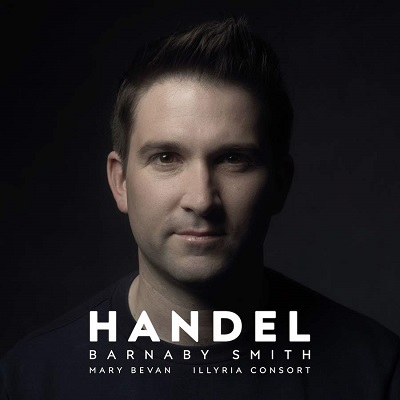In August 2021, as part of VOCES8’s Live From London Summer 2021 Festival, countertenor Barnaby Smith, soprano Mary Bevan and the The Illyria Consort (led by violinist Bojan Čičić) presented a streamed concert entitled Handel’s Heroes and Heroines. It was a fitting title giving that VOCES8, of which Smith is the Artistic Director, has been one of the most ‘heroic’ ensembles during the pandemic, mounting a series of online festivals which have given work to hundreds of singers and musicians and pleasure to huge international audiences – and which I have been delighted to have been able to enjoy and review on these pages.
The aforementioned concert was a ‘taster’ for this disc, which is titled, simply, Handel – as if this is the last word on the matter – in which Smith goes ‘back to his roots’. Smith trained as a solo singer but, he explains, “my deep-set roots in choral music (first forged as a treble at Westminster Abbey), and the energy I derive from ensemble singing, always appealed more – the result – VOCES8”. That undoubted energy has fuelled the ensemble’s innovative programming, inspiring education work, and vibrant performances. At times I have found Smith’s Tiggerish bounce – both in performance and in pre- and post-concert conversation with VOCES8’s diverse and esteemed collaborators – a little too exuberant. But, what is never in doubt is the genuineness of the countertenor’s music-making, and on this debut solo album – which took shape during lockdown, after the birth of Smith’s first child Orlando inspired a desire to record his pre-fatherhood voice as a legacy for his new son – this sincerity and communicativeness shine through.

The chosen repertoire serves up no surprises. With these arias and duets, drawn from ‘Handel’s greatest works’, Smith shares a “playlist of favourite tracks by my vocal idols” – music which has been the ‘backtrack’ of his daily life. The disc opens with ‘Ombra mai fù’ from Serse and The Illyria Consort certainly conjure both the lush splendour of the King of Persia’s garden and the comforting sweetness of the shade offered by the plane tree that the monarch so lovingly lauds. The string sound is beautifully blended, but movement within individual lines speaks effortlessly, and David Miller’s theorbo provides delicate, tasteful propulsion. The engineers have done a splendid job, aided by the gloriously resonant acoustic of the VOCES8 Centre where the disc was recorded, and when the voice enters it is to the fore but never too dominant.
Smith’s countertenor is a lovely instrument: sweet-toned, almost succulent, relaxed. The opening messa di voce is confident and tasteful; appoggiaturas and trills are well-executed, persuasively integrated into the majestic vocal line and expressive of the King’s ironically ardent gratitude. The aria’s extensive range causes no problems, and Smith’s countertenor sounds free and clear at the top. If he’s tempted to linger just a little too long on the high fermata at the end of the penultimate phrase, then perhaps that aptly captures the zealousness of Serses’ arboreal tribute. It’s good to have the preceding recitativo accompagnato too, which is delivered with naturalness. My only very minor quibble is that, while the changes in register within and between the phrases are cleanly executed, there’s sometimes a slight sense of hastiness, Smith anticipating the instrumental beat by a whisker when executing the intervallic leap. It creates a hint of urgency which, ever so slightly, ruffles the feathers of the aria’s noble graciousness.
In live performance Smith’s Rinaldo’s ‘Cara sposa, amante cara’ impressed with regard to both technical assurance and expressive articulacy. All of the qualities I admired on that occasion are present in this recording: the full tone, the even strength of high and low registers, the searching quality of the chromatic sequences and falling sighs, and, especially, the light agility and crisp accuracy of the furious outbursts in the B section as Rinaldo rages against the wicked spirits that have abducted his beloved Almirena. However, the opportunity to listen more closely, and repeatedly, leads me to feel that Smith doesn’t quite capture the lament’s prevailing mood of despairing resignation. He puts a bit too much effort into the beauty of each note at the expense of the long lines’ lyricism and wistful dying falls. Similarly, the text is carefully enunciated, but heavily aspirated consonants sometimes create an agitation that is best conveyed through the strings’ restless, searching counterpoint – the latter is played here with strong character, and swells and throbs with feeling in the forte episodes. Smith doesn’t quite make one feel the vulnerabiltiy of Rinaldo, a man’s whose innocence has been disillusioned by the sorceress’s Armida’s devious cruelty.

In ‘Venti, turbini’, however, in which Rinaldo calls upon nature’s tempests to help him gain vengeance, the buoyancy and brightness of Smith’s countertenor come into their own. He races exuberantly through the long, elaborate runs as if Rinaldo is indeed borne aloft on a beneficent wind – a gusty gale niftily conjured by bassoonist Catriona McDermid. And, as if Handel doesn’t furnish sufficient florid challenges, Smith takes off in daring vocal flights in the da capo, Rinaldo’s confidence conveyed by the vocal energy and passion. Every detail is nailed. McDermid and leader Čičić stir up a storm in the instrumental introduction, the solo lines interlocking perfectly with gusts from the tutti ensemble. It’s terrifically exciting stuff.
From Ariodante we have ‘Scherza infida’. The tempo is fairly swift and, though the recorded sound is lucid, in the instrumental opening the well-defined bassoon and pizzicato bass overpower the delicacy of the eloquently ‘weeping’ violins. It all feels rather intense and when the voice enters, Smith’s forthrightness conveys Ariodante’s anger at seeing, he mistakenly believes, his beloved Ginevra emerging from the private apartments of Polinesso, but does not capture his suicidal anguish. This long aria needs more light and shade than Smith offers, more variation of tone colour. Certainly, the ringing clarity of Smith’s countertenor, the focused intonation, the strength and beauty at the top are impressive, but the triplets feel too insistent, the loud dynamic unalleviated, and – when Ariodante declares that Ginevra’s betrayal will send him to seek solace in the embrace of death – the flowing melisma lacks the necessary limpid melancholy. It all sounds far too upbeat.
‘Verdi Prati’ (from Alcina), however, is soothingly lyrical and even. The fairly low tessitura shows off the surprisingly ripe richness of Smith’s countertenor, and the fullness of the ensemble sound creates a sense of expanse – complemented by the broad lilt of the triple-time meter – evoking the beautiful island vista which seduces and nourishes Ruggiero, even as he admits that it is mere illusion. Indeed, one feels that Smith might even have taken a little more time, to give more room to the elegant embellishments which convey the knight’s delight in the luscious greenery; a slight holding back, as the bass descends, before the final repetition of the opening phrase might have served as an expressive ‘sigh’, a sort of musical slipping away to match the fading beauty of the green meadows and pleasant woods.

Mary Bevan joins Smith for two duets. From Rodelinda we have the duet for Rodelinda and Bertarido which concludes Act 2, ‘Io t’abbraccio’. Handel’s phrase structures and harmonies are sophisticated and challenging, and at times the tuning isn’t entirely settled, but Bevan’s gleaming cut-glass soprano makes a nice foil to Smith’s softer edges, particularly in the winding sequences of suspensions. ‘These labours past’ from Handel’s final oratorio Jephtha is a delight – a vibrant outpouring of the present passion and imagined future happiness that Iphis and Hamor share. Čičić and his fellow violinist Davina Clarke set a fittingly gallant mood. The dotted rhythms are taut and dynamic, the bow strokes brisk, against which the two voices blend in delicious chains of parallel thirds and sixths, the triplets flowing freely as the lovers’ joy overflows. Handel injects a note of faux seriousness in the central section, with its contrapuntal dialogues, but the fiddles intervene with dancing, descending trills, luring the beloveds away from worldly concerns and back into their bubble of self-absorption. The voices indulge in an extravagant cadential flourish before the dal segno allows them to celebrate themselves once more, in high spirited bliss. It’s impossible to listen to such singing and playing without a smile on one’s face!
The disc ends with a sequence of numbers from Giulio Cesare in Egitto. In fact, the final number, the duet ‘Caro! [Bella!] più amabile belta’, is a recording (made in May) of the performance that was live-streamed in August. Bevan curls her soprano around Cleopatra’s vocal eye-lash-fluttering and skips through the tripping twirls of the melody with lightly sparkling grace; Smith warms the gleam from below, his phrasing shapely and lithe. Before that The Illyria Consort get things underway with an Overture which is just as dignified, proud and infectiously vivacious as their rendition of The Arrival of the Queen of Sheba earlier on the disc. In ‘Va tacito’ Gavin Edwards’ lovely warm horn solo seem designed to make one stand tall and straighten one’s shoulders, and Smith’s Caesar is certainly confident in his military prowess and cunning, though always eloquent. The bravery of both singer and soldier is evident in ‘Al lampo dell’armi’, in which Smith confronts the virtuosic challenges with the same courage that Caesar faces Tolomeo’s soldiers. The coloratura is punchy and pinpoint accurate; the unison violins bring Handel’s musical inventiveness to vivid dramatic life. Listening to this superb track – never mind singing it – surely raises the heartbeat and offers some cardiac conditioning as effective as any aerobic exercise routine.
Perhaps Handel is, as Smith admits, a ‘vanity project’. But, it offers an opportunity for the countertenor to show us what his voice can do and how well-suited it is, and accomplished, in repertoire that we are unlikely to hear him sing with VOCES8. Whether it’s a one-off or there will be more solo albums to come from Smith, time will tell. In the meantime, do enjoy this disc and get ready for the next instalment of Live from London: the Christmas 2021 festival starts on 4th December.
Claire Seymour
Barnaby Smith (countertenor), Mary Bevan (soprano), The Illyria Consort
Handel: ‘Frondi tenere’, ‘Ombra mai fù’ (Serse HWV 40); ‘Venti, turbini, prestate’, ;Cara sposa, amante cara’ (Rinaldo HWV 7); ‘These Labours Past’ (Jephtha HWV 70): ‘The Arrival of the Queen of Sheba’ (Solomon HWV 67); ‘Scherza infida’ (Ariodante HWV 3); ‘Io t’abbraccio’ (Rodelinda, Regina de’ Longobardi HWV 19); ‘Verdi prati’ (Alcina HWV 34); Overture, ‘Va tacito’, ‘Al lampo dell’ armi’, ‘Caro! (Bella!) Più amabile belta (Live) (Giulio Cesare in Egitto HWV 17)
VCM 136 [63:03]